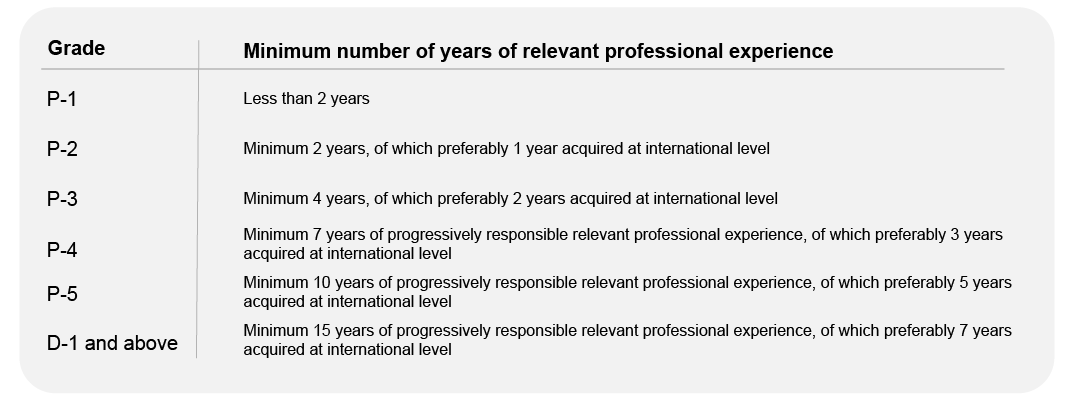International Professionals are recruited internationally and are expected to serve at different duty stations throughout their career within the Organization. There is a wide range of jobs in this category requiring a high degree of educational, substantive expertise, analytical and communication skills, and/or managerial leadership ability.
UNESCO applies the following standard recruitment requirements, as a general rule, for minimum educational requirements combined with a minimum number of years of relevant work experience. The qualifications required for each post are specified in the individual vacancy notices. The standard recruitment requirements for International Professional and Director and above posts are as illustrated as follows:
- Professional experience

- Education
An advanced university degree (Master or equivalent) in education, culture, science, social and human sciences, communication, business administration or a related field is required for posts in the professional category. A Doctorate degree may be required for specific positions.
- Languages
Excellent knowledge of English or French (the two working languages of UNESCO) is required. Good knowledge of the other language is an asset. Knowledge of one of the official languages of UNESCO (Arabic, Chinese, Spanish or Russian) is an additional asset.
- Benefits
International Professional staff are entitled to allowances and benefits, such as:
? Salary
UNESCO offers a competitive package of salaries and benefits which are set by the International Civil Service Commission (ICSC) and are similar across United Nations Agencies. Salaries are made of two elements.
* Base salary
* Post adjustment (different for each location, as the cost of living varies between duty stations)
The salary scales and post adjustment indices is available here .
? Family
Staff members may be eligible for a range of family allowances and benefits linked to the dependency status of members of their family.
? Education
UNESCO contributes to the cost of education of dependent children, if applicable.
? Relocation
The following benefits will help staff on relocation:
* Settling-in grant: is paid to assist in meeting initial costs when arriving at or relocating to a new duty station;
* Travel and shipping expenses: are paid to staff on assignment, and when moving from one duty station to another. At some duty stations, a hardship allowance linked to living and working conditions is also paid.
* Rental Subsidy: can normally be granted to help new arrivals
? Mobility entitlements
* Mobility and Hardship: The Mobility incentive and Hardship allowance are designed to encourage mobility between duty stations and compensate staff for the difficult living and working conditions in some field locations.
* Rest and Recuperation: Rest and recuperation breaks are granted to staff members serving in field locations where the work environment is considered to be extremely stressful, isolated, insecure, or lacking the most basic and essential services.
* Danger pay: Danger pay is a special allowance granted to staff who work in duty stations where very dangerous conditions, such as war or active hostilities, prevail and/or where the evacuation of families and non-essential staff is necessary. A list of countries and duty stations where Danger pay applies is on the United Nations site.
? Holidays and leave
* Annual leave: is granted to staff at the rate of 2.5 working days per month.
* Maternity Leave: consists of 16 weeks of paid leave.
* Paternity Leave: 4 weeks of paid leave; increased to 8 weeks in non-family duty stations.
* Official holidays: At Headquarters, French public holidays are non-working days. In field offices, official holidays are established in accordance with local United Nations practice.
? Pension and Insurance
UNESCO is a member of the United Nations Joint Staff Pension Fund that provides retirement, death, disability and related benefits for staff upon cessation of their services.
Staff are covered in case of death and disability from the beginning of their appointment and upon separation from service, they may be entitled to a lifetime pension benefit based on their age and length of contributory service.
UNESCO also offers a medical benefits fund that provides medical insurance benefits to existing and former staff members and their eligible family members. Coverage is worldwide and provides for the reimbursement of a major portion of the expenses for medical health care.
(来源 联合国教科文组织)

